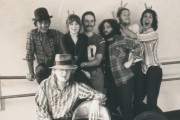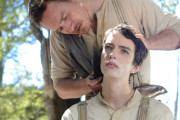 At times both brutally hilarious and brutally honest, Lonely Boys is the type of low-budget gem you hope to see in the program of a film festival. It combines clever writing, amusing performances, and a story that is familiar enough to relate to but eventually veers into territory that challenges the viewer.
At times both brutally hilarious and brutally honest, Lonely Boys is the type of low-budget gem you hope to see in the program of a film festival. It combines clever writing, amusing performances, and a story that is familiar enough to relate to but eventually veers into territory that challenges the viewer.
Jules (Dan Simon, who also co-wrote and directed the film) is a frustrated playwright who is struggling with rewrites demanded by the producer of his latest play. He visits his friend Saul (Gregory Lay, who also co-developed the story), a frustrated house manager of a Brooklyn restaurant who is dissatisfied with the quality of the food he is serving (including an elk burger that apparently tastes “like Chris Christie’s ass”). In addition, both Jules and Saul are hung up on women who broke their hearts — Jules was dumped by his girlfriend two months ago, while Saul has refused to sign the papers to finalize the divorce that his estranged wife is waiting for. While Jules has tried to curb his drinking to help his writing, Saul rarely is without an alcoholic beverage in his hand, and when he’s drinking his maturity level drops significantly. Moreover, he expects Jules to drink with him, sobriety be damned.
As much as they are best friends, Jules and Saul are also partners in misery. With their personal lives in shambles, the pair can’t stop themselves from self-destructing their professional lives too. These are two friends who are each trying to work through some very deep pain, and at times it seems that their “solution” is to implement a scorched earth strategy over the rest of their lives. It also doesn’t help when drunk Saul has no problem with lashing out at Jules, making the friendship seem like something that ran out of steam years ago and all that’s left is the pretense. The question here is where or not this is a friendship that still works.
Of course, the heart of the film is the relationship between Jules and Saul, which in some ways is reminiscent of Dante and Randal’s friendship in Clerks, another low-budget indie film about two friends struggling with personal situations. Lay’s performance as Saul recalls Randal’s irreverent, boisterous attitude, which (like Randal) hides his true nature. Of the two, Saul is the one is far more troubled. Jules is at least trying to improve his life, though he is also torn about compromising his writing for mainstream success. He’s even trying to move on from his breakup, as evidenced by his cringeworthy attempt to pick up a woman in Saul’s restaurant early in the film. On the other hand, Saul is convinced that his wife will come back to him and leaves her desperate messages on her voicemail. You can imagine how well that goes over.
Without saying too much, the third act brings Jules and Saul to a place where they are free to engage in pleasure without emotional attachment. But for two thirty-somethings that are hung up on emotional abandonment issues, that isn’t the solution to their problems. But damn, it is a lot of fun to see them try. Actually, you’ll probably feel bad getting this much amusement out of these characters’ troubles.
For a movie shot on a low-budget, the cinematography by Alex Watson-Eng really stands out. Cinematographers can make or break a film an indie film by making a movie that cost thousands of dollars look like it cost a lot more. It’s also challenging to make a film that involves a lot of walking-and-talking look interesting, but Watson-Eng’s camerawork matches the quality of the writing by Simon and co-writer Patrick Davin.
Lonely Boys and its closing shot stuck with me long after the film ended because anyone can see pieces of themselves in Jules and Saul. We’ve all been there, even if we’ve never been at the end of our ropes quite like they have. The end result is a film that cleverly explores the true meaning of an old friendship with unexpected narrative twists. In other words, the type of movie that reminds you what a few people with a small budget and a camera can do when they have a humorous and honest story to tell.

















